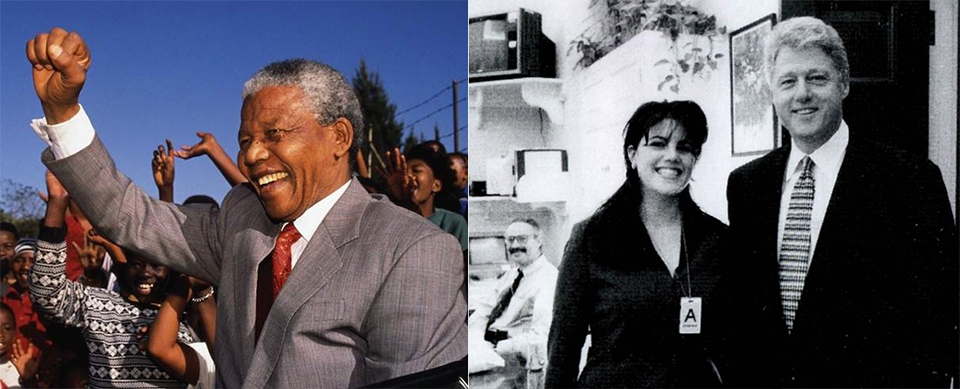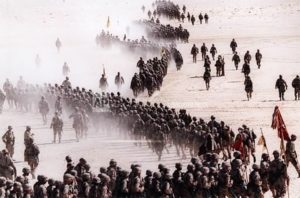

American and coalition troops advance through Kuwait, expelling Iraqi forces in 1991.
Raymond Arke | News Editor
10/26/17
Most of the students at Duquesne were learning to walk and talk during the 1990s, so The Duke News section takes a look back at the big events of the decade that still impact the world today.
The First Gulf War aka Operation Desert Storm (1991)
Iraqi dictator Saddam Hussein invaded the small, oil-rich country of Kuwait drawing worldwide condemnation in 1990. The U.S. organized a massive group of European and Middle Eastern countries to oppose Saddam. In January 1991, the coalition launched massive airstrikes followed by a U.S.-led ground assault which expelled the Iraqis in 42 days. After the war, the U.S. continued to enforce a no-fly zone over Iraq, and Saddam’s government refused to allow U.N. weapon inspectors into the country. The tensions would again boil over in 2003.
World Wide Web debuts (1991)
Tim Berners-Lee, a British computer scientist, developed the first web page browser and web server in 1990 when he worked at the CERN physics lab. He released the first web page on the public Internet and in 1991, the entire world was invited to join. The web soon took off, and home computer sales boomed as Microsoft, Bill Gates and Steve Jobs would take advantage of the accessible Internet. By the end of the decade, sites like Google, eBay and Amazon had taken shape, and many more were available. The world had been revolutionized.
Fall of the USSR (1991)
Beginning in the late 1980s, cracks began to spring in the Soviet Union’s communist empire. Extreme economic difficulties, paired with growing nationalist movements, led Mikhail Gorbachev, the last leader of the Soviet Union, to expand freedom of speech across the country. As the Soviet government struggled to control the demands for more freedoms, a group of hardline Communists staged a coup in August of 1991. Gorbachev was kidnapped, and the organizers announced he could no longer govern. Popular demonstrations broke out against the coup and the Soviet Army rebelled and joined the protests. The coup organizers surrendered, and Gorbachev was returned to power until his resignation in December 1991. In January of the next year, the Soviet Union was no more, divided into numerous democratic states with Russia being the largest.
Rodney King Riots (1992)
In 1991, King, an African-American, and two passengers were pulled over after a high speed chase with police outside Los Angeles. A bystander videotaped the police brutally beating an unarmed King, hitting him with batons over 50 times. King sustained 11 fractures. On April 29, 1992 the four white officers involved in the beating were acquitted. Protests that day turn violent and a state of emergency was declared after a white truck driver was beaten by a mob. Riots spread over the next six days, with over 50 dead and thousands injured. Thousands of fires spread throughout the city. By May 3, thousands of federal troops and National Guard marched the streets, ending one of the worst race riots in American history.
Rwandan Genocide (1994)
The two main ethnic groups in Rwanda, the Hutus and the Tutsi, had a history of conflict. The Tutsi, the minority, had ruled the country since colonial days until they were overthrown by the Hutu majority in 1959. Tutsi exiles formed a rebel group and fought a civil war from 1990 to 1993. In early April 1994, a plane carrying the Rwandan and Burundi president, both Hutus, was shot down, and the Tutsi rebels were blamed. Over the next 100 days, Hutus killed over 800,000 people, most of them Tutsi. The international community did little to stop the murders, as the U.N. forces in Rwanda were not given the ability to stop the killing. The U.S. sent no help.
Nelson Mandela becomes South African president (1994)
Mandela was inaugurated as South Africa’s first democratically elected president, a year after winning the Nobel Peace Prize and four years after being released from prison. Mandela had started a career in politics in the 1960s, when South Africa was an apartheid state run by whites. He led nonviolent protests and strikes against the apartheid regime before being jailed in 1964.
Oklahoma City Bombing (1995)
The worst terrorist attack on U.S. soil, prior to 9/11, occurred on April 19, 1995, and killed over 160 people. Timothy McVeigh, a U.S. Army veteran, detonated a truck bomb in front of the Alfred Murrah Federal Building in Oklahoma City. McVeigh was arrested after a massive manhunt, and it was found he had links to radical right-wing groups. He was sentenced to death and was executed in 2001.
NATO’s intervention in the Bosnian War (1995)
The country of Bosnia-Herzegovina declared independence from Yugoslavia in 1992. For the next three years, Bosnian Serbs and the Yugoslav army, consisting of mostly Serbs, targeted and slaughtered over 100,000 Bosnian Muslims and Croatian civilians while invading the country. In the summer of 1995, three towns still remained in control of the Bosnian government and were declared “safe havens” from Serbian advancement by the U.N. The Serbian forces ignored the declaration of protected zones, and attacked one of the towns, killing more civilians. In August, the Serbians refused to comply with a U.N. ultimatum and NATO joined Bosnian and Croatian forces in massive airstrikes and a ground offensive. The intervention was successful, leading to U.S.-led peace talks which created a Bosnian state.
President Bill Clinton’s Impeachment Trials (1998/1999)
A wide spanning investigation, which included charges of sexual harassment, culminated in the U.S. House of Representatives voting for the impeachment of President Bill Clinton on December 19, 1998. Clinton had begun an affair with Monica Lewinsky, a White House intern, in 1995. Lewinsky was transferred to the Pentagon in 1996 and began to confide to a coworker about her affair. The coworker secretly recorded Lewinsky and then met with Ken Starr, an independent prosecutor who had begun investigating Clinton over a real-estate deal scandal in the early ‘90s. FBI agents wired the coworker and had her obtain more information from Lewinsky. Lewinsky was offered immunity and agreed to cooperate with the investigation. Clinton publicly denied having a sexual relationship with Lewinsky. Starr submitted a report to the House which laid out the case for impeaching Clinton on the grounds of perjury and obstruction of justice. After the affirmative House vote, the Senate voted on Feb. 12 and acquitted the President. Clinton remained in office for the rest of his term.



